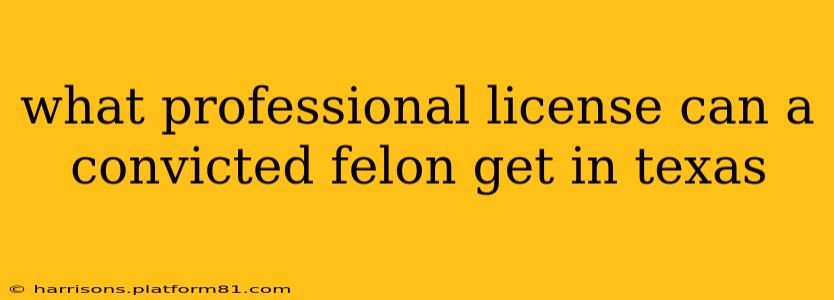What Professional Licenses Can a Convicted Felon Get in Texas?
Navigating the professional licensing landscape in Texas after a felony conviction can be challenging, but it's not impossible. The eligibility for various professional licenses depends heavily on the specific nature of the felony, the time elapsed since conviction, and the individual's rehabilitation efforts. There's no simple yes or no answer; each case requires individual assessment. This guide provides a general overview and highlights key considerations.
Understanding Texas's Approach to Felon Licensing:
Texas takes a nuanced approach to licensing professionals with criminal records. The state recognizes the importance of rehabilitation and second chances, but also prioritizes public safety. Many licensing boards operate under the principle of "public interest," meaning they must balance an individual's right to work with the need to protect the public. This often involves a thorough review of the applicant's background, including the nature of the felony, the circumstances surrounding it, and evidence of rehabilitation.
Factors Affecting License Eligibility:
Several factors significantly impact a convicted felon's ability to obtain a professional license in Texas:
-
Type of Felony: The nature of the crime is paramount. Felonies involving violence, dishonesty, or a breach of public trust are likely to face stricter scrutiny. For example, obtaining a license to work with children or handle finances would be far more challenging after a conviction for child abuse or embezzlement.
-
Time Elapsed Since Conviction: The passage of time since the felony conviction often plays a crucial role. Many licensing boards prefer to see evidence of sustained rehabilitation over an extended period.
-
Rehabilitation Efforts: Demonstrating genuine rehabilitation is essential. This can involve completing probation or parole successfully, undergoing counseling or therapy, maintaining a clean record, and actively participating in community service. Providing documented evidence of these efforts is crucial in the application process.
-
Specific Licensing Board Requirements: Each licensing board in Texas has its own specific rules and regulations regarding applicants with felony convictions. Some boards may have more lenient policies than others. It is crucial to consult directly with the specific licensing board governing your chosen profession.
H2: Which Licenses are More Difficult to Obtain?
Licenses requiring high levels of public trust, such as those in healthcare, finance, education, and law enforcement, are generally the most difficult to obtain after a felony conviction. These professions often involve direct interaction with vulnerable populations or the handling of sensitive information. The licensing boards for these professions tend to have more stringent requirements for applicants with criminal records.
H2: Which Licenses Might Be More Accessible?
While no guarantees exist, some professional licenses might be more accessible to convicted felons, depending on the nature of the felony and the individual's circumstances. These often involve less direct interaction with the public or less sensitive information. However, thorough research into specific board requirements remains paramount.
H2: How Can I Increase My Chances of Obtaining a License?
-
Consult with a Licensing Attorney: An attorney specializing in professional licensing can provide invaluable guidance throughout the application process, advising on the likelihood of success and assisting with the preparation of a compelling application.
-
Thoroughly Research the Specific Board Requirements: Each licensing board has unique rules. Directly contacting the relevant board and requesting information specific to applicants with felony convictions is crucial.
-
Document Your Rehabilitation Efforts: Keep meticulous records of all rehabilitation activities, including therapy sessions, community service, and any other efforts demonstrating your commitment to reform.
-
Present a Strong Application: A well-written, comprehensive application demonstrating genuine remorse, rehabilitation, and a commitment to ethical conduct significantly increases the chances of approval.
H2: What Happens if My Application is Denied?
If your application is denied, you have the right to appeal the decision. This often involves presenting additional evidence or arguing the board's decision was based on an incorrect interpretation of the law or your circumstances. An attorney specializing in professional licensing can assist with this appeal process.
Disclaimer: This information is for general guidance only and does not constitute legal advice. Always consult with a qualified Texas attorney and the specific licensing board for accurate and up-to-date information regarding your individual circumstances.
